Mexico: : Free Trade Agreements, APEC, USMCA/NAFTA 2.0

Agreements (Mexico): Colombia, Costa Rica, Guatemala, the EU, EFTA, Israel
- APEC
- ALADI
- Association of Caribbean States (ACS)
- SELA
- Mesoamerica Project
- PECC
- The U.S.-Mexico-Canada Agreement (USMCA/NAFTA 2.0)
- Mexico-EU Agreement
- Mexican Trade Agreements: Colombia, Costa Rica, Nicaragua, Israel, Northern Triangle (El Salvador, Guatemala, and Honduras), EFTA, Uruguay, Paraguay, Japan, and Chile
- Andean Community (Associate)-Mexico
- Mexico-Ecuador Economic Complementation Agreement
- Mexico-MERCOSUR Economic Complementation Agreement
- Peru-Mexico Trade Integration Agreement
- Mexican Economic Complementation Agreements
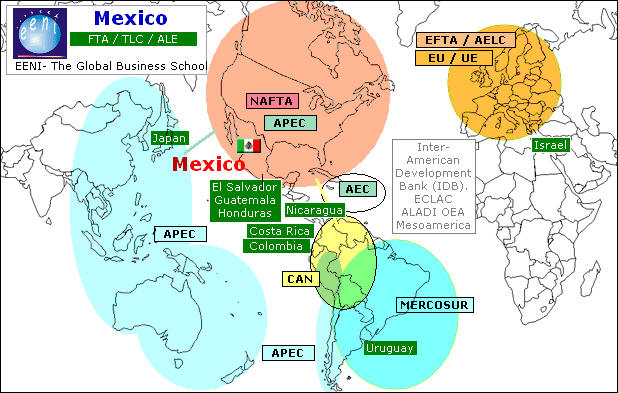


The Subject “Mexican Free Trade Agreements” belongs to the following Online Programs taught by EENI Global Business School:
Masters: International Business, Foreign Trade.
Doctorate: Global Trade, American Business.
Languages:  or
or  México
México  Mexique
Mexique  Mexico.
Mexico.
Mexican Economy, Carlos Slim, Competitive Advantages, Jalisco, Nuevo Leon, Chihuahua...
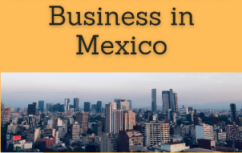
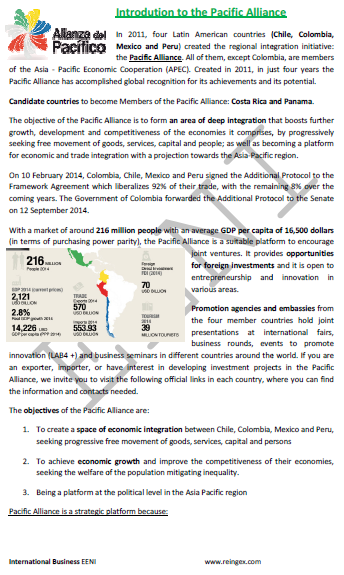
The United Mexican States has signed more Free Trade Agreements than any other nation in the World and this has positioned Mexico as one of the ten largest exporters worldwide and one of the main foreign direct investment (FDI) receivers. Mexico has signed Free Trade Agreements with forty-three economies.
- USMCA/NAFTA 2.0
- Mexico-Northern Triangle (El Salvador, Guatemala, and Honduras)
- Mexico-Central America (Costa Rica, El Salvador, Guatemala, Honduras, Nicaragua) Agreement
- Pacific Alliance
- Mexico-Costa Rica Agreement
- Mexico-Nicaragua Agreement
- Mexico-Colombia Agreement
- Mexico-Uruguay Agreement
- Mexico-Chile Agreement
- Mexico-MERCOSUR (Economic Complementation Agreement)
- EU-Mexico
- Mexico-EFTA
- Mexico-Japan Agreement
- Israel-Mexico Agreement
- Argentina-Mexico Economic Complementation Agreement
- Brazil-Mexico Economic Complementation Agreement
- Peru-Mexico Agreement
- Mexico-Bolivia Economic Complementation Agreement
- Mexico-Ecuador Economic Complementation Agreement
- Mexico-Paraguay Economic Complementation Agreement
- Mexico-Panama Agreement
- Mexico-Cuba Economic Complementation Agreement
- APEC
- Agreement for Trans-Pacific Partnership
- Trade Negotiations Among Developing Countries
- Global System of Trade Preferences
- Andean Community-Mexico
- CARICOM (Observer State)
- SICA (observer country)
- Union of South American Nations (UNASUR) (observer country)
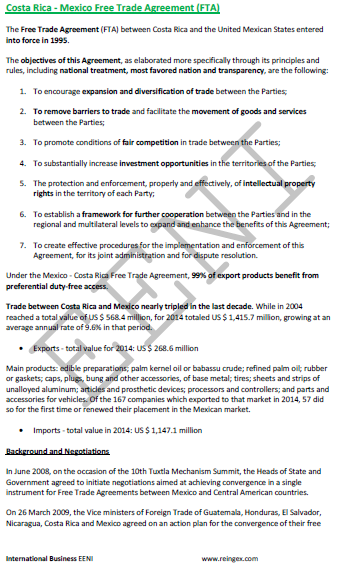
- WTO
- WCO
- International Road Transport Union (IRU)
- Hamburg Rules (Sea)
- International Chamber of Shipping (ICS)
Regional institutions of Mexico
- Latin American Integration Association (ALADI)
- Association of Caribbean States
- Latin American and Caribbean Economic System
- PEEC
- ECLAC
- Inter-American Development Bank
- Organization of American States (OAS)
- Central American Integration System (Associated state)
- Mesoamerica Project
- CELAC
- FEALAC

- OECD
- UN
- UNCTAD
- ITC
- UNCITRAL
- WIPO
- WB
- WTO
- IMF
Mexico is a member of the UN, Economic Cooperation and Development, IMF, WB, International Finance Corporation, UNCTAD, WTO, G-20, G-5.
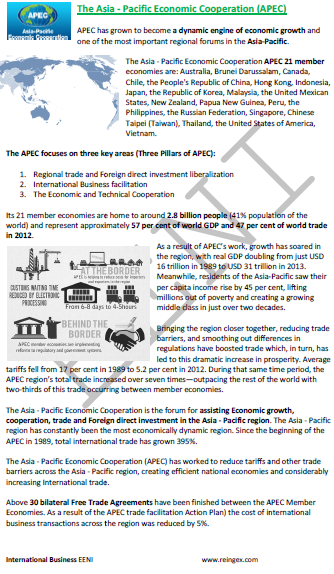
(c) EENI Global Business School (1995-2024)
We do not use cookies
Top of this page



